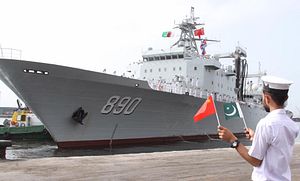The United States Department of Defense recently released a report concerning China’s military power. According to the report, China may be considering a large naval base in Pakistan as its potential second overseas military installation, after Djibouti.
Conventionally, Pakistan has maintained cordial relations with China for several decades and is now set to attract major investments from the latter as part of Beijing’s One Belt, One Road (OBOR) initiative. While Pakistan may not be overtly averse to the idea of a Chinese military base in Pakistan for different economic and security reasons, the country has had similar experiences in the past. Those experiences showed Pakistan the negative aspects of being a client state and had several unintended negative consequences.
During the late-1950s, the United States set up a military base in Pakistan as part of Washington’s security pact with Islamabad to contain the former Soviet Union. In the late 1970s and most part of the 1980s, Pakistan allowed the Central Intelligence Agency’s (CIA) presence in the country to contain Moscow’s military intervention in Afghanistan and beyond. Following the 9/11 attacks, the regime of President Pervez Musharraf permitted the United States to set up military bases in Pakistan to conduct operations inside Afghanistan. The presence of American intelligence agencies in Pakistan was facilitated in different ways too: not only were CIA military installations were put in place in Pakistan, but there were also periods of close collaboration between the intelligence agencies of the two countries.
While the strategic nature of the intelligence collaboration between both countries cannot be denied, the presence of U.S.’s military bases on Pakistan’s soil has brought major challenges. Historically, the U.S. has used Pakistan’s soil to launch attacks in Afghanistan, which to some extent, have also exacerbated tensions between Kabul and Islamabad. Reportedly, the U.S. at one point was engaged in carrying out drones strikes in Pakistan’s tribal areas from its bases in the country that caused resentment among the wider public not just against the US, but also against Pakistan’s own ruling elite.
For Pakistan, arguably, the deadliest fallout of this collaboration was the rise of right-wing extremist Islamist and insurgent groups in the country, which turned against the state largely due to Islamabad’s military collaboration with Washington. Moreover, the fallout in this regard has also been due to Pakistan’s inability to manage Washington’s “soft power” image in the country, which has resulted in right-wing Islamist groups terming Pakistan’s ruling elite as American puppets while also targeting the state’s interests through violent and non-violent means.
Similarly, should Beijing build a naval base in Pakistan, there are considerable risks for Islamabad. While a permanent naval base in Pakistan extends China’s military outreach to safeguard its maritime interests, it reduces Pakistan to the status of a client state with higher risks of unintended consequences and few gains. Beijing’s traditional reliance on so called “commercial diplomacy” to extend its influence beyond its borders is fast becoming obsolete, for the country has in the last few years, actively sought to build its military muscle to protect its economic and security interests abroad.
While Pakistan, for its part, would like to see a Chinese military presence protect its interests, such as thwarting India’s growing naval power and maritime reach, Beijing’s agenda is hardly driven by Islamabad’s expectations and interests. China’s primary motivation in this regard stems from its desire to expand its global military reach. In the coming years, it’s likely that Beijing will actively rely on its military power to pursue interests globally.
For instance, India and China may have a border dispute, but the conflict between them is nothing like what it is between New Delhi and Islamabad. The only major point of contention between Beijing and New Delhi deals with both countries’ intense economic competition to gain regional and global influence. It’s highly probable that in the coming years, India and China’s bilateral confrontation will become reduced because of growing economic interdependence between the two countries and their mutual desire to maintain stability in the region.
This situation leaves Pakistan in a conundrum. Over the years, if Washington continuously demanded Pakistan’s compliance to deal with various insurgent groups that operate with its alleged support, it doesn’t mean that China will not ask for similar actions from Islamabad in the near future. In fact, compared to Washington, Beijing’s partnership is likely to prove more demanding for Pakistan.
Arguably, Islamabad’s deepening economic and military dependence on China doesn’t compare to the country’s decades-long association with Washington. With China, it’s perceivable that Pakistan may gradually lose its leverage as far as its domestic and regional security priorities are concerned, for, unlike Washington, any objection to Beijing’s demands may choke the country economically given Islamabad’s growing dependence on the country. While it’s unlikely that China may push Pakistan into an economic isolation, for Islamabad this threat will always remain a glaring possibility.
Moreover, Beijing’s naval base will always present the threat that Pakistan had with the presence of U.S. military installations in the country. Previously, military bases awarded for offensive and non-offensive operations have hardly remained in Pakistan’s control or under strict oversight. In China’s case too, the prospect of a military base in Pakistan being used without the consent of Islamabad or beyond the host country’s jurisdiction and interests will remain a likely scenario.
Pakistan needs to reassess its long term security and economic objectives before inviting China’s permanent military presence to the country, which places the country’s sovereignty at stake.

































